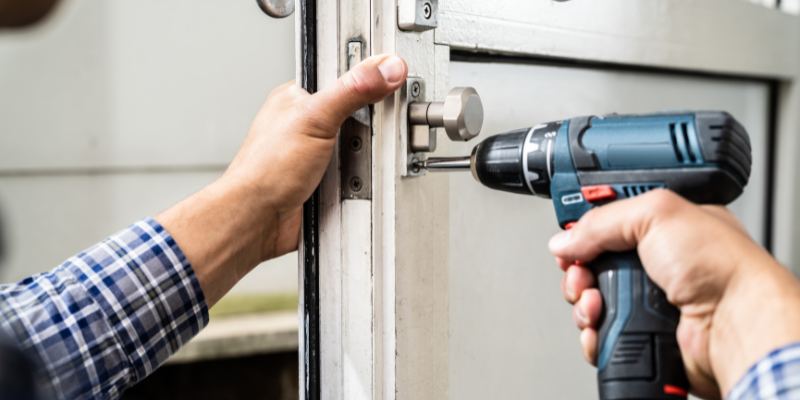23 Urgent Steps to Force Your Lazy Landlord to Make Repairs
You’ve probably experienced that sinking feeling when your landlord ignores yet another maintenance request, leaving you frustrated and living with problems that shouldn’t exist.
Whether it’s a leaky faucet that’s driving up your water bill or a malfunctioning heater that’s making winter unbearable, you don’t have to accept substandard living conditions.
While many tenants feel powerless in these situations, you actually have numerous legal rights and practical strategies at your disposal.
Before you resign yourself to living with repairs that never happen, consider these proven steps that can transform an unresponsive landlord into an active property manager.

Document Everything With Photos
Visual evidence is your strongest ally when requesting landlord repairs. Take clear, detailed photos of every maintenance issue as soon as you spot it.
Document the date and time on each image, and capture multiple angles to show the full scope of the problem.
Don’t just photograph the obvious damage – capture any related issues like water stains, mold growth, or structural concerns.
Create a detailed log that pairs your photos with written descriptions.
Store these images in multiple secure locations: your phone, cloud storage, and email them to yourself.
If your landlord claims they weren’t aware of the problem or disputes its severity, your documented evidence will protect your rights and strengthen your case.
Consider recording video evidence as well, especially for issues involving leaks, electrical problems, or safety hazards.
Send Written Repair Requests

After gathering your photo evidence, put your repair request in writing – this creates an official paper trail that’s hard to ignore.
Send your written request via certified mail with return receipt, keeping copies of everything.
You’ll want proof that your landlord received your complaint.
Detail each repair needed, citing specific lease clauses or local housing codes when possible.
Include the date you first noticed the problem and any previous verbal requests you’ve made.
Set a reasonable deadline for repairs – usually 14-30 days, depending on the severity.
State clearly that you’ll pursue legal remedies if repairs aren’t completed by the deadline.
Don’t forget to list your contact information and when you’re available for repair workers to access your unit.
You’ve got rights – now exercise them properly.
Know Your Tenant Rights
Every tenant has fundamental legal rights regarding property maintenance and repairs.
You’re entitled to a habitable living space that meets basic health and safety standards.
Your landlord must maintain essential services like heating, plumbing, electricity, and structural integrity.
Don’t let your landlord intimidate you. State laws protect you from retaliation if you request repairs or file complaints.
You’ve got the right to withhold rent in many jurisdictions when major repairs go unfixed, but you’ll need to follow strict legal procedures.
Your lease can’t waive these basic rights, even if there’s language claiming otherwise.
Check your local tenant rights organizations and housing codes.
They’ll spell out specific timelines for repairs, minimum living standards, and your legal remedies.
Document everything – your rights are only as strong as your ability to prove violations.
Start a Repair Log

A detailed repair log serves as your shield against negligent landlords.
Document every repair issue with photos, videos, and detailed notes.
Include dates, times, and specific descriptions of problems – from leaky faucets to dangerous electrical issues.
Keep copies of all communication with your landlord, including texts, emails, and certified letters.
Don’t forget to note when you made repair requests and how your landlord responded (or didn’t respond).
Track any expenses you’ve incurred due to the repairs, and save every receipt.
Store your repair log digitally and in hard copy. Create backups in cloud storage and share access with a trusted friend.
This documentation isn’t just paperwork – it’s evidence you’ll need if you decide to take legal action or withhold rent legally.
Get Everything in Writing
Protecting your tenant rights demands written documentation of every interaction with your landlord.
Send all repair requests through certified mail or email, and keep copies of everything you send and receive. D
on’t rely on verbal agreements or promises – they won’t hold up in court.
Create a paper trail by following up every phone conversation with an email that summarizes what was discussed.
Write down dates, times, and details of all communications. Include photos of the repairs needed, timestamped and dated.
Save screenshots of text messages and keep all responses from your landlord.
If your landlord tries to communicate only verbally, respond with: “Please confirm this in writing.”
This documentation becomes your shield if you need to take legal action or withhold rent legally.
Contact Building Code Enforcement

When landlords ignore serious repair requests, local building code enforcement officers become your powerful allies.
Contact your city’s building inspection department to file a formal complaint about code violations.
You’ll need to provide your address, detailed description of problems, and documentation of previous repair requests to your landlord.
Building inspectors will schedule a property inspection, usually within 1-2 weeks.
They’ll document violations, issue citations to your landlord, and set strict deadlines for repairs.
If your landlord fails to comply, they’ll face escalating fines and potential legal consequences.
Don’t let your landlord intimidate you – it’s illegal for them to retaliate against tenants who report code violations.
Keep copies of all inspection reports and citations, as they’ll serve as essential evidence if you need to take legal action later.
Join Your Local Tenants Association
While building code enforcement provides official backing, joining forces with other tenants can multiply your influence.
Search online for local tenants’ rights organizations or housing advocacy groups in your area.
You’ll connect with experienced advocates who know your rights and can guide you through legal processes.
Once you’ve joined, you’ll gain access to valuable resources, including free legal clinics, sample complaint letters, and databases of problematic landlords.
You’ll also learn about successful strategies other tenants have used to force repairs.
Most importantly, you’ll have strength in numbers – landlords are more likely to respond when faced with organized tenant action rather than individual complaints.
Don’t let your landlord isolate you.
There’s protection and power in organizing with others who’ve faced similar challenges.
Call Health Department Inspectors

If your landlord continues to ignore repair requests, you should contact your local health department immediately.
Health inspectors have the authority to investigate housing code violations and issue citations that carry hefty fines.
Document every repair issue with photos and notes before the inspector arrives.
You’ll need to provide access to your unit during business hours.
The inspector will examine problems like mold, pest infestations, electrical hazards, plumbing issues, and structural defects.
Make sure to get a copy of the inspection report.
If violations are found, your landlord will receive a notice with a deadline to fix the issues.
The health department can impose daily fines until repairs are completed.
They may even condemn the property if conditions are severe enough, forcing your landlord to act or face serious consequences.
Research State Housing Laws
Knowing your state’s tenant protection laws gives you powerful leverage when dealing with negligent landlords.
Search your state’s housing authority website or legal aid resources to find specific regulations about repair timeframes, habitability standards, and tenant rights.
Print these laws and highlight sections that apply to your situation.
Most states require landlords to maintain basic living standards, including working plumbing, heat, electricity, and weatherproofing.
You’ll also find laws about rent withholding, repair-and-deduct options, and breaking your lease if repairs aren’t made.
Don’t let landlords intimidate you with false claims about their obligations.
Document every violation that breaks state law, and cite specific statutes in your written complaints.
Your landlord’s legal obligations don’t depend on their feelings – they’re bound by state law.
Withhold Rent Legally

Should your landlord fail to make critical repairs, rent withholding serves as a powerful legal tool – but you must follow precise steps to avoid eviction.
First, document all repair requests and communication in writing.
Send a formal notice giving your landlord reasonable time to fix the issue, typically 30 days or as specified by state law.
Before withholding rent, establish an escrow account at your bank and deposit the full rent amount there each month.
Don’t spend this money – it proves you’re acting in good faith.
Take photos and gather witness statements about the unsafe conditions.
Keep detailed records of how the problems affect your daily life.
Never withhold rent without written notice and proper documentation.
Some states require court approval before you can legally withhold rent, so verify your local requirements first.
Hire Licensed Home Inspector
A licensed home inspector strengthens your position when dealing with unresponsive landlords.
You’ll get a detailed, professional report documenting every deficiency, code violation, and safety hazard in your rental unit.
This official documentation serves as powerful evidence if you need to take legal action.
Don’t hire just any inspector – make sure they’re certified by a recognized organization like ASHI or InterNACHI.
Before the inspection, create a list of specific concerns you want them to examine.
Take photos of problem areas and share them with the inspector beforehand. Request that they include repair cost estimates in their report.
Once you receive the inspection report, send a copy to your landlord via certified mail.
Keep the original report safe – you’ll need it if you decide to sue or report violations to housing authorities.
File Small Claims Court

Legal action through small claims court becomes necessary when landlords ignore documented repair requests and inspection reports.
You’ll need to gather all communication records, photos, inspection findings, and repair estimates before filing your claim.
Most small claims courts handle disputes up to $10,000, making them ideal for habitability issues.
File your case at your local courthouse, paying close attention to filing deadlines and documentation requirements.
You’ll need your landlord’s legal name and correct address for proper service.
Present your evidence chronologically, showing how your landlord’s inaction has violated your lease agreement and local housing codes.
Don’t forget to include any expenses you’ve incurred due to the disrepair, such as hotel stays or replacement costs.
You can typically represent yourself without an attorney, saving legal fees.
Consider Repair and Deduct
Under specific state laws, you’re entitled to repair serious defects yourself and deduct the costs from your rent payments.
First, document the repair need with photos and written notices to your landlord.
If they fail to respond within your state’s required timeframe, you can proceed with the repair and deduct method.
Hire a licensed professional to fix the issue and keep all receipts, contracts, and documentation.
Don’t exceed your state’s maximum deduction limit, which is typically one or two months’ rent.
Submit copies of all repair documentation to your landlord with your reduced rent payment.
Remember, this option only applies to repairs that affect habitability, like broken heating, plumbing issues, or structural problems.
Be prepared for potential pushback from your landlord and maintain detailed records to protect yourself legally.
Contact Housing Authority

Reaching out to your local housing authority serves as an essential step when landlords refuse to address serious repair issues.
They’re empowered to inspect your rental unit, document violations, and issue citations that force your landlord to act.
Contact your city or county’s housing department immediately.
You’ll need to file a formal complaint, providing detailed information about repair problems and your previous attempts to resolve them with your landlord.
Document everything with photos and copies of communications.
The housing inspector will schedule a visit to evaluate code violations.
If they find issues, they’ll typically give your landlord a specific deadline to complete repairs.
Failing to comply can result in hefty fines or legal action against your landlord.
Stay in touch with the inspector and request follow-up visits if repairs aren’t completed properly.
Gather Witness Statements
Strong witness statements can greatly bolster your case against a negligent landlord.
Start by asking other tenants to document their observations of the repair issues in writing.
Make sure they include specific dates, descriptions of the problems, and any interactions with the landlord about repairs.
Don’t just limit yourself to current residents.
Reach out to former tenants who experienced similar issues, as their testimonies can establish a pattern of landlord negligence.
Ask maintenance workers who’ve seen the problems to provide statements too.
Have each witness sign and date their statement, and if possible, get them notarized.
Keep copies of all witness statements in your records, and make sure each person understands they might need to testify if your case goes to court.
Their support could be essential in forcing your landlord to act.
Request Official Property Inspection

A professional property inspection serves as powerful evidence when dealing with a negligent landlord.
Contact your local housing authority or building department to schedule an official inspection of your rental unit.
Don’t let your landlord know in advance – you want the inspector to see the true conditions.
During the inspection, point out every violation, from minor issues to major safety hazards.
Make sure the inspector documents everything with photos and detailed notes.
Request a copy of the official inspection report immediately – you’re legally entitled to it.
This report carries significant legal weight and can force your landlord’s hand.
If the inspector finds code violations, they’ll typically issue a notice giving your landlord a deadline to make repairs.
Keep this documentation safe – it’s essential evidence if you need to take legal action.
Send Certified Demand Letters
Every successful legal strategy against negligent landlords must include properly documented demand letters sent through certified mail.
You’ll need to write a detailed letter stating all repair issues, citing your state’s landlord-tenant laws, and demanding resolution within a specific timeframe – typically 14-30 days depending on the severity.
Send these letters via certified mail with return receipt requested, keeping copies of everything.
Your demand letter should reference previous communications, include photographs of problems, and clearly state that you’ll pursue legal remedies if repairs aren’t completed.
Don’t make threats, but firmly outline the consequences of continued negligence.
Create a paper trail that proves you’ve given your landlord reasonable notice and opportunity to fix the issues.
This documentation becomes essential evidence if you need to take legal action later.
Use Escrow Account

Once your demand letters don’t produce results, setting up an escrow account provides powerful legal protection for withholding rent payments.
Rather than keeping rent money yourself, deposit it into this special account to show you’re acting in good faith while demanding repairs.
Visit your local bank to establish the escrow account specifically for your rent payments.
Keep thorough records of all deposits and notify your landlord in writing that you’ve taken this action.
Explain that funds will be released only when repairs are completed to code.
Make sure you’re following your state’s specific laws about rent escrow.
Don’t touch the escrowed money – it’s still technically rent.
If your landlord takes legal action, you’ll have proof that you’ve set aside the full amount while seeking necessary repairs.
Report to Better Business Bureau

Filing a complaint with the Better Business Bureau (BBB) takes your repair dispute beyond escrow accounts and into the public sphere.
The BBB maintains detailed records of business complaints, creating public pressure on your landlord to address maintenance issues.
Visit BBB.org and submit your complaint with specific details about failed repair requests, dates, and your previous attempts to resolve the situation.
Include copies of written communications, photos of the problems, and records of any verbal agreements.
Don’t exaggerate – stick to verifiable facts. You’ll receive a case number to track your complaint’s progress.
The BBB will contact your landlord, who must respond within 14 days.
While the BBB can’t force repairs, their involvement often motivates landlords to act since poor ratings can damage their reputation and future business prospects.
Seek Legal Aid Services

Legal aid organizations provide free or low-cost representation for tenants facing repair disputes with landlords.
You’ll find these services through local housing advocacy groups, law schools, and community organizations.
Don’t hesitate to seek their help – it’s your right as a tenant.
Contact multiple legal aid offices since availability can be limited.
You’ll need to provide documentation of your repair requests, photos of the problems, and proof of your income to qualify for services.
Many organizations prioritize cases involving health and safety violations.
Your legal aid attorney can help you understand your rights, draft formal demand letters, file complaints with housing authorities, and represent you in court if necessary.
They’ll protect your interests and guarantee your landlord can’t retaliate against you for exercising your legal rights.
File Housing Discrimination Complaint

When your landlord discriminates against you while handling repair requests based on your race, religion, disability, or other protected characteristics, you have the right to file a formal complaint with the U.S. Department of Housing and Urban Development (HUD).
You can submit your complaint online, by phone, or by mail within one year of the discriminatory action.
Document every instance of discrimination, including repair delays, dismissive treatment, or disparate maintenance standards compared to other tenants.
Take photos, save communications, and gather witness statements.
You’ll need to provide HUD with your contact information, your landlord’s details, and a clear description of the discriminatory actions.
Don’t let intimidation stop you – it’s illegal for landlords to retaliate against tenants who file discrimination complaints.
HUD will investigate your case free of charge.
Contact Local Media

Reaching out to local media outlets can pressure negligent landlords into addressing serious repair issues, especially after other remedies have failed.
Contact local TV news stations’ investigative teams, who often run “problem solver” segments exposing landlord negligence.
Send them clear photos and videos documenting the repairs needed, along with copies of your written repair requests and the landlord’s responses.
Neighborhood newspapers and local online news sites are also effective channels for exposing substandard housing conditions.
Make sure you’ve got solid documentation of the problem and your attempts to resolve it through proper channels.
When speaking with reporters, stick to verifiable facts about safety violations, health hazards, or building code issues.
Don’t make personal attacks or unsubstantiated claims that could undermine your credibility or expose you to legal liability.
Break Lease Without Penalty
Severe repair issues that threaten health or safety can give you the right to break your lease without financial penalties.
This is known as “constructive eviction” – when your landlord’s neglect makes the property uninhabitable.
You’ll need solid documentation of the problems and your attempts to resolve them.
First, review your state’s landlord-tenant laws to confirm your right to terminate.
Then, send your landlord a final written notice stating you’ll terminate the lease if repairs aren’t made within a specific timeframe.
Take photos and gather inspection reports or expert opinions that prove the unit’s unsafe conditions.
If the landlord still doesn’t act, notify them in writing that you’re terminating the lease due to breach of contract.
Move out completely, return the keys, and demand your security deposit back.
FAQs
How Long Should I Wait Between Repair Requests Before Escalating?
You shouldn’t wait longer than 14 days after your initial repair request. Document everything and send a second written notice. If there’s no response within 7 days, you’re justified to escalate the situation.
Can My Landlord Raise Rent in Retaliation for Reporting Repairs?
What goes around comes around – retaliatory rent increases are illegal. You’re protected by law from landlord revenge. Don’t back down – document everything and report illegal increases to your local housing authority immediately.
What Repairs Am I Legally Responsible for as a Tenant?
You’re responsible for minor repairs from normal use – like changing light bulbs, unclogging drains, and replacing batteries. Any damage you cause is your responsibility. Major repairs remain your landlord’s legal obligation.
Will Insurance Cover Temporary Housing During Major Repair Work?
Your renter’s insurance may cover temporary housing costs during major repairs, but it’ll depend on your policy. You’ll want to check your coverage details and contact your insurance provider directly for confirmation.
Can Neighboring Tenants Join My Repair Complaint Against Our Landlord?
Just like you’re united against poor conditions, you can join forces legally. Any tenant affected by the same repair issues can absolutely combine complaints, strengthening your case and putting more pressure on your landlord.
Final Thoughts
Stand firm against your landlord’s negligence – you’re not powerless in this fight.
Picture yourself building an ironclad case with each photo, document, and inspection report you collect.
Like a skilled chess player, you’ll strategically move from documentation to legal action, protecting your right to a safe home.
Don’t let repair requests gather dust; transform them into powerful leverage that forces your landlord’s hand into action.